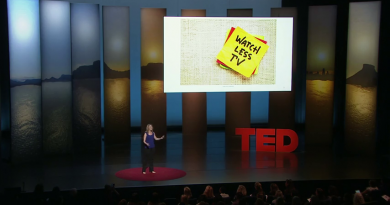Crédito da Imagem: David Edelstein on Unsplash
Neste vídeo do portal TED.COM, com duração de 2m12s, Derek Sivers nos mostra que o que é estranho para nós, pode ser normal em outras culturas. Com exemplos de várias partes do mundo, ele nos mostra que devemos manter uma mente aberta e não rotular como estranhos hábitos e atitudes que são apenas diferentes.
| Audio | |
|---|---|
Normal | Slow |
| English Transcript | Tradução |
| So, imagine you're standing on a street anywhere in America and a Japanese man comes up to you and says, | Imagine que você está em uma rua em algum lugar nos Estados Unidos e um japonês se aproxima e diz: |
| "Excuse me, what is the name of this block?" | "Com licença, qual é o nome desta quadra?" |
| And you say, "I'm sorry, well, this is Oak Street, that's Elm Street. This is 26th, that's 27th." | E você diz: "Desculpa. Bom, esta é a Rua Oak, aquela é a Rua Elm. Esta é a 26ª e aquela é a 27ª Avenida?. |
| He says, "OK, but what is the name of that block?" | Ele diz, "Entendi, mas qual é o nome daquela quadra?" |
| You say, "Well, blocks don't have names. Streets have names; blocks are just the unnamed spaces in between streets." | Você responde: "Quadras não têm nomes. As ruas têm nomes; as quadras são apenas os espaços sem nome entre as ruas". |
| He leaves, a little confused and disappointed. | Ele vai embora, um pouco confuso e desapontado. |
| So, now imagine you're standing on a street, anywhere in Japan, you turn to a person next to you and say, "Excuse me, what is the name of this street?" | Agora imagine que está numa rua, em algum lugar no Japão, vira-se para uma pessoa por perto e diz: "Com licença, qual é o nome desta rua?" |
| They say, "Oh, well that's Block 17 and this is Block 16." | Ela responde: "Aquela é a quadra 17 e esta é a quadra 16". |
| And you say, "OK, but what is the name of this street?" | E você diz: "Mas qual é o nome desta rua?" |
| And they say, "Well, streets don't have names. Blocks have names. Just look at Google Maps here. There's Block 14, 15, 16, 17, 18, 19. All of these blocks have names, and the streets are just the unnamed spaces in between the blocks. | Ela responde: "As ruas não têm nomes. As quadras têm nomes. Veja aqui no Google Maps. Temos as quadras 14, 15, 16, 17, 18, 19. Todas elas têm nomes. As ruas são apenas os espaços sem nome que ficam entre as quadras?. |
| And you say then, "OK, then how do you know your home address?" | Então você diz: "Então como sabe o endereço da sua casa?" |
| He said, "Well, easy, this is District Eight. There's Block 17, house number one." | Ela responde: "É fácil, este é o Distrito Oito. Este é o bloco 17, casa número 1?. |
| You say, "OK, but walking around the neighborhood, I noticed that the house numbers don't go in order." | Você diz: "Mas caminhando pelo bairro, vi que os números das casas não seguem uma ordem". |
| He says, "Of course they do. They go in the order in which they were built. The first house ever built on a block is house number one. The second house ever built is house number two. Third is house number three. It's easy. It's obvious." | Ele diz, "Claro que seguem! Estão na ordem em que foram construídas. A primeira casa construída numa quadra é a número um. A segunda é a número dois. A terceira é a número três. É fácil. É óbvio." |
| So, I love that sometimes we need to go to the opposite side of the world to realize assumptions we didn't even know we had, and realize that the opposite of them may also be true. | Eu adoro o fato de que às vezes precisamos ir ao outro lado do mundo para perceber suposições que não sabíamos que tínhamos, e perceber que o oposto disto também pode ser verdade. |
| So, for example, there are doctors in China who believe that it's their job to keep you healthy. So, any month you are healthy you pay them, and when you're sick you don't have to pay them because they failed at their job. They get rich when you're healthy, not sick. | Então, por exemplo, há médicos na China que acreditam que o trabalho deles é te manter saudável. A cada mês que estiver saudável, você os paga e quando está doente, não precisa pagá-los, pois falharam no trabalho. Eles enriquecem se você estiver saudável, não doente. |
| In most music, we think of the "one" as the downbeat, the beginning of the musical phrase: one, two, three, four. But in West African music, the "one" is thought of as the end of the phrase, like the period at the end of a sentence. So, you can hear it not just in the phrasing, but the way they count off their music: two, three, four, one. | Na maioria das músicas pensamos no "um" como o início da frase musical. Um, dois, três, quatro. Mas na música do Oeste Africano, o "um" é contado como o final, como o ponto ao fim de uma frase. Podemos ouvi-los não como nas frases, mas em como eles contam sua música. Dois, três, quatro, um. |
| And this map is also accurate. | E este mapa também é correto. |
| There's a saying that whatever true thing you can say about India, the opposite is also true. | Há um ditado que diz: "Qualquer coisa verdadeira sobre a Índia, o contrário também é verdade". |
| So, let's never forget, whether at TED, or anywhere else, that whatever brilliant ideas you have or hear, that the opposite may also be true. | Então, nunca esqueça: seja no TED, ou em qualquer outro lugar, quaisquer ideias brilhantes que você tenha ouvido, o contrário delas também pode ser verdade. |
| (Japanese) Domo arigato gozaimashita. | (Japonês) Domo arigato gozaimashita. |
Contagem de Palavras
A tabela abaixo exibe as palavras encontradas nesta música/vídeo/texto bem como o número de vezes em que aparecem.
| Freq. | Palavra | Freq. | Palavra | Freq. | Palavra |
|---|---|---|---|---|---|
| 29 | the | 16 | you | 14 | is |
| 13 | of | 13 | and | 11 | in |
| 9 | say | 8 | to | 8 | this |
| 8 | they | 8 | that | 8 | a |
| 7 | so | 7 | house | 7 | have |
| 7 | block | 6 | street | 6 | one |
| 5 | well | 5 | names | 5 | but |
| 5 | blocks | 4 | you're | 4 | what |
| 4 | we | 4 | true | 4 | streets |
| 4 | opposite | 4 | ok | 4 | number |
| 4 | name | 4 | just | 4 | he |
| 4 | don't | 4 | at | 4 | are |
| 4 | also | 3 | two | 3 | three |
| 3 | there's | 3 | them | 3 | their |
| 3 | that's | 3 | says | 3 | on |
| 3 | music | 3 | it's | 3 | healthy |
| 3 | go | 3 | built | 3 | anywhere |
| 2 | when | 2 | whatever | 2 | unnamed |
| 2 | then | 2 | th | 2 | standing |
| 2 | spaces | 2 | sick | 2 | realize |
| 2 | phrase | 2 | pay | 2 | order |
| 2 | or | 2 | not | 2 | me |
| 2 | may | 2 | know | 2 | job |
| 2 | japanese | 2 | imagine | 2 | I |
| 2 | hear | 2 | four | 2 | excuse |
| 2 | ever | 2 | end | 2 | easy |
| 2 | do | 2 | can | 2 | between |
| 2 | be | 2 | as | 1 | your |
| 1 | world | 1 | who | 1 | which |
| 1 | whether | 1 | west | 1 | were |
| 1 | way | 1 | walking | 1 | up |
| 1 | turn | 1 | thought | 1 | third |
| 1 | think | 1 | thing | 1 | these |
| 1 | there | 1 | ted | 1 | sorry |
| 1 | sometimes | 1 | side | 1 | sentence |
| 1 | second | 1 | saying | 1 | said |
| 1 | rich | 1 | phrasing | 1 | person |
| 1 | period | 1 | oh | 1 | off |
| 1 | obvious | 1 | oak | 1 | numbers |
| 1 | now | 1 | noticed | 1 | next |
| 1 | never | 1 | neighborhood | 1 | need |
| 1 | musical | 1 | most | 1 | month |
| 1 | maps | 1 | map | 1 | man |
| 1 | love | 1 | look | 1 | little |
| 1 | like | 1 | let's | 1 | leaves |
| 1 | keep | 1 | japan | 1 | it |
| 1 | india | 1 | I'm | 1 | ideas |
| 1 | how | 1 | home | 1 | here |
| 1 | had | 1 | gozaimashita | 1 | |
| 1 | get | 1 | forget | 1 | for |
| 1 | first | 1 | failed | 1 | example |
| 1 | even | 1 | else | 1 | elm |
| 1 | eight | 1 | downbeat | 1 | domo |
| 1 | doctors | 1 | district | 1 | disappointed |
| 1 | didn't | 1 | course | 1 | count |
| 1 | confused | 1 | comes | 1 | china |
| 1 | brilliant | 1 | believe | 1 | beginning |
| 1 | because | 1 | assumptions | 1 | around |
| 1 | arigato | 1 | any | 1 | america |
| 1 | all | 1 | african | 1 | address |
| 1 | accurate | 1 | about |









